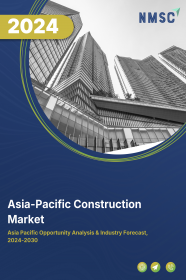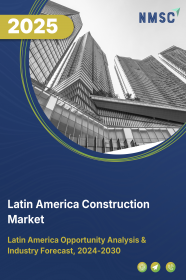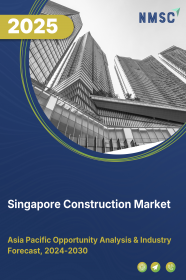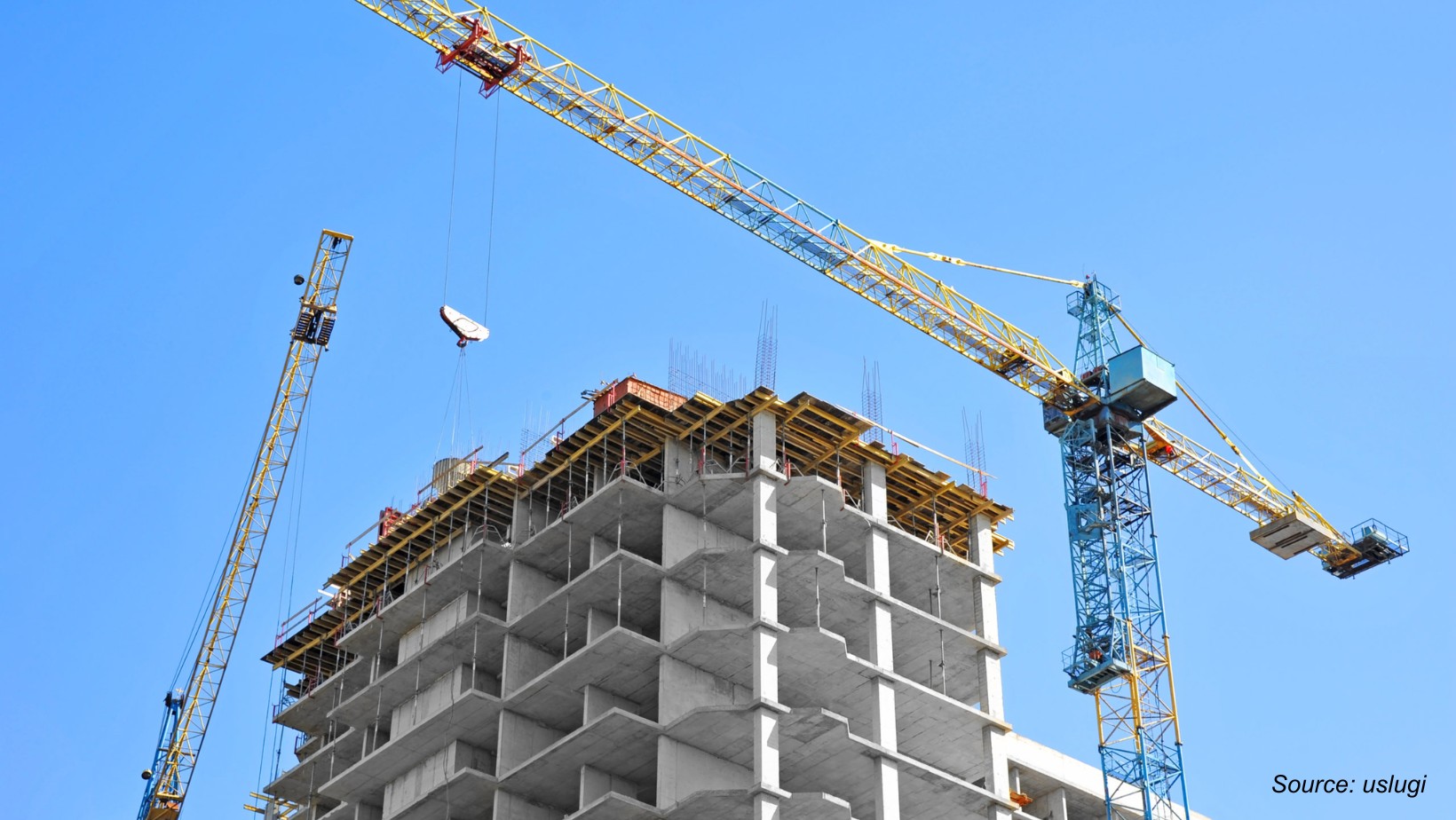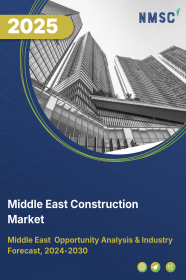
Middle East Construction Market by Type (Renovation, and New Construction), by Sector (Real Estate and Others), by Construction Method (Traditional Construction, Prefabricated/Modular Construction, 3D Printed Construction, Green/Sustainable Construction), and by Type of Contractor (Large Contractor, Medium Contractor and Small Contractor) – Regional Industry Trends and Forecast, 2025–2030
Industry: Construction & Manufacturing | Publish Date: 25-Jun-2025 | No of Pages: 194 | No. of Tables: 146 | No. of Figures: 91 | Format: PDF | Report Code : CM2226
Middle East Construction Industry Overview
The Middle East Construction Market size was valued at USD 337.43 billion in 2024, and is projected to grow to USD 361.60 billion by 2025. Additionally, the industry is expected to continue its growth trajectory, reaching USD 401.17 billion by 2030, with a CAGR of 2.1% from 2025 to 2030.
The Middle East construction sector is experiencing rapid growth, fueled by large-scale infrastructure projects and significant investments in countries like Oman, Saudi Arabia, and Kuwait. Major developments, such as new urban and energy initiatives, are driving the region's infrastructure advancement.
Despite these positive trends, the market faces challenges due to complex regulatory frameworks and lengthy permitting processes, which can delay projects and increase costs.
However, the adoption of Building Information Modeling (BIM) and the integration of advanced technologies like AI, IoT, and cloud systems are offering new opportunities to enhance project accuracy, collaboration, and efficiency, paving the way for further growth in the region.
Strategic Infrastructure Projects In Oman Boost Market Momentum
Oman is witnessing a surge in strategic infrastructure initiatives aimed at enhancing regional connectivity and urban development. The government is channeling efforts into transformative megaprojects that not only elevate the country’s infrastructure standards but also stimulate economic diversification. Noteworthy developments in 2023 include the Rathath (Drizzle) Boulevard in Dhofar, Rimal Park in South Al Batinah, and the Aames Bay Development in Musandam. These landmark projects underscore Oman’s commitment to modernization and are playing a key role in accelerating the infrastructure sector’s growth.
Large-scale Investments Driving Saudi Arabia’s Infrastructure Expansion
Saudi Arabia's construction market is experiencing robust growth, primarily fueled by a wave of substantial public and private sector investments. In 2023, infrastructure funding soared to USD 18 billion, according to the Global Infrastructure Hub. The energy sector attracted the highest allocation with USD 7.6 billion, while road transportation followed with USD 5.6 billion. This strong financial commitment reflects the Kingdom’s Vision 2030 goals and is expected to sustain the momentum of infrastructure development across various sectors, driving long-term economic and urban transformation.
Regulatory Complexities Hindering Market Growth
Navigating regulatory complexities presents a significant challenge in the construction market. Infrastructure projects often face hurdles due to the intricate network of government regulations and permitting procedures. Infrastructure initiatives require numerous permits and approvals from governmental bodies at local, regional, and national levels.
These mandates include adherence to zoning regulations, environmental assessments, compliance with building codes, safety standards, and various other regulatory requirements. Lengthy permit acquisition processes, bureaucratic inefficiencies, and regulatory disparities among different jurisdictions can significantly prolong project timelines and inflate costs. Moreover, fluctuations in regulations or unexpected policy changes can disrupt ongoing projects and deter potential investments.
Integration of Digitalization and BIM Presents Lucrative Opportunity for Market Expansion
The Middle East construction industry is rapidly advancing toward digital transformation, with Building Information Modeling (BIM) playing a central role. In January 2024, Dubai Municipality mandated the use of BIM for certain building permit applications, signaling the government’s commitment to improving project efficiency, sustainability, and regulatory compliance through digital tools.
This policy move aligns with regional strategies aimed at enhancing construction quality, safety, and long-term asset management—further supporting national objectives related to urban development and economic diversification.
Competitive Landscape
The key players operating in the Middle East construction industry include Bechtel, Parsons Corporation, Saudi Binladin Group (SBG), Arabtec Construction LLC, KBR, Fluor Corporation, Larsen And Toubro Limited (L And T), ACCIONA Keller Group Plc, Al Habtoor Group, Kharafi National, Combined Group Contracting Co. (CGC), Emaar Properties, Qatari Diar Real Estate Investment Company, Tiger Properties, and others.
Middle East Construction Market Key Segments
By Type
-
Renovation
-
New Construction
By Sector
-
Real Estate
-
Residential
-
Affordable
-
Luxury
-
-
Commercial
-
Retail Buildings
-
Office Buildings
-
Hospitality
-
Healthcare Facilities
-
Educational Institutes
-
Entertainment Ventures
-
-
- Infrastructure
-
Transportation
-
Airport
-
Port
-
Rail
-
Road
-
-
Water and Wastewater
-
Energy
-
Telecommunication
-
- Industrial
-
Manufacturing Plant
-
Warehouses
-
Power Plants
-
Oil Refineries
-
Chemical Plants
-
By Construction Method
-
Traditional Construction
-
Prefabricated/Modular Construction
-
3D Printed Construction
-
Green/Sustainable Construction
By Type of Contractor
-
Large Contractor
-
Medium Contractor
-
Small Contractor
By Country
-
Saudi Arabia
-
United Arab Emirates (UAE)
-
Israel
-
Qatar
-
Kuwait
-
Oman
-
Other Countries
Key Players
-
Bechtel
-
Parsons Corporation
-
Saudi Binladin Group (SBG)
-
Arabtec Construction LLC
-
KBR
-
Fluor Corporation
-
Larsen And Toubro Limited (L And T)
-
ACCIONA
-
Keller Group Plc
-
Al Habtoor Group
-
Kharafi National
-
Combined Group Contracting Co. (CGC)
-
Emaar Properties
-
Qatari Diar Real Estate Investment Company
-
Tiger Properties
REPORT SCOPE AND SEGMENTATION:
|
Parameters |
Details |
|
Market Size in 2024 |
USD 337.43 Billion |
|
Revenue Forecast in 2030 |
USD 401.17 Billion |
|
Growth Rate |
CAGR of 2.1% from 2025 to 2030 |
|
Analysis Period |
2024–2030 |
|
Base Year Considered |
2024 |
|
Forecast Period |
2025–2030 |
|
Market Size Estimation |
Billion (USD) |
|
Growth Factors |
|
|
Companies Profiled |
15 |
|
Market Share |
Available for 10 companies |
|
Customization Scope |
Free customization (equivalent up to 80 working hours of analysts) after purchase. Addition or alteration to country, regional, and segment scope. |
|
Pricing and Purchase Options |
Avail customized purchase options to meet your exact research needs. |




















 Speak to Our Analyst
Speak to Our Analyst



